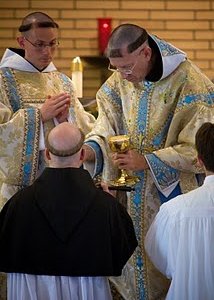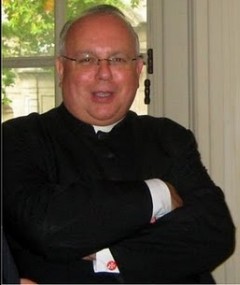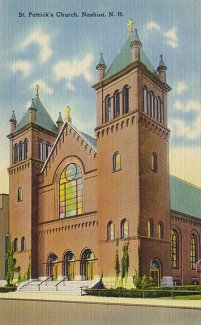

|
| Musical Musings: Miscellaneous |
|
|
Let's Be ReasonableOut in Left (or Right) FieldI know there are people who think, "We worked hard to get rid of Latin. It has no place in liturgy. Let's move beyond that." There are people who say, "There is no place for the Novus Ordo Mass in the Roman Catholic Church, in English or in Latin. It's a debauched and heretical style of worship." Let's be reasonable. Thinking like this is fringe, preposterous and not terribly worthy of debate among faithful, orthodox Catholics who truly believe what the Church teaches. But proponents of these extreme viewpoints can't see how ludicrous are their positions. Our best tack — be reasonable. By that, I mean staying close, "white-on-rice" close, to the Church, her teachings, her Magisterium, her catechism, and liturgically speaking, her rubrics. That makes one a "faithful moderate," in my opinion, a perfectly sensible thing to be. Where there are two sides of an issue, the faithful moderate can see both — and can reap the benefits accordingly. Latin... English — it's not either/or; it's both. Let me introduce you to two faithful moderates, who can see and appreciate both sides of the coin. The Canons Regular of the New Jerusalem
The Canons, led by their prior, The Very Rev. Dom Daniel Augustine Oppenheimer, have a deep love of the liturgy of the Church. They find the beauty and solemnity of the worship most manifest in the Latin language and live their lives surrounded by Latin ritual. Dom Daniel and the fraters under him celebrate daily Mass in Charles Town: 7:00 am weekdays, 9:30 am Saturdays, and 10:15 am Sundays. An evening Mass is celebrated each First Friday at 7:00 pm and on other special days (like the Feast of the Assumption). The Divine Office is prayed daily, and the public is welcome to attend. What makes these Canons "faithful moderates" though? While they as a community embrace the Extraordinary Form and the Latin language, they offer no disdain for the Ordinary Form celebrated properly. Before the full establishment of their community in West Virginia, and not having scheduled full Holy Week liturgies of their own, the fraters had attended Easter Vigil liturgies in English at Saint James Church in Charles Town. They hold no resentment toward those who celebrate the Ordinary Form and certainly shirk any "holier-than-thou" attitudes. They are kind Catholics who simply want to do the Lord's work in their portion of the vineyard.
I asked Dom Daniel why a group of canons who pray in Latin would be interested in promoting this English liturgy. His answer was humbling and insightful: "We are sponsoring this symposium because this new English translation shows phenomenal progress in the development of the Ordinary Form. We rejoice that it will be available to the Church as a whole." That's seeing the good in both "camps." Saint Patrick Church, Nashua NH
But what makes this parish part of the "faithful moderates?" The parish, while using the Ordinary Form at the regular weekend liturgies, does not ignore the Extraordinary Form as a perfectly legitimate option for Catholic worship. Begun by the former pastor, Rev. Martin T. Kelly, the Traditional Latin Mass was celebrated two Sundays a month in the early afternoon. After Fr. Kelly's death in the summer of 2011, the new pastor, Rev. Michael Kerper, has vowed to continue the practice. Music in the parish makes abundant use of Gregorian chant, both in English and in Latin. The Mass Propers are being introduced slowly, and are gaining an enthusiastic welcome by parishioners and clergy, as the true texts of the Mass are being sung not just in the Latin Masses, but in the regular English parish Masses. Using Meinrad tones and English texts, as well as the Graduale Simplex and Latin texts, both schola and congregation are experiencing the texts and music of the Church the way they are meant to be. A musician at Saint Patrick's told me about the following comment made by a mother of many children, speaking about her first time at the church: May I say, "Thanks a lot!" I didn't catch a single one of my kids dancing to the tunes in church today. Between the non-dance style, churchy music and the straight-forward, no story-hour homily, we weren't entertained at all. The only thing we had left to do was pray! Imagine. Praying at Mass!!! See you next Sunday! His response? "It was the nicest thing anyone has ever written to me about the music we do at Mass." Faithful ModeratesThese two examples show that the future of good liturgy in the Church lies with faithful moderates who don't "create" liturgy and don't denounce the "horrors" of English-language worship, and who accept fully what the Church envisions for us, her children. No more liturgy as polemic. Politics does not belong at Mass. English is good; Latin is good —Basta! (as they would say at the Vatican). Let's be reasonable. Let's be Faithful Moderates. |
Submit Your Music / Contact Us / Company Description / Links
 This cleric institute of consecrated life was founded in La Crosse, Wisconsin, by Bishop (now Cardinal) Raymond Burke in 2002.
They have now established a residence and Priory of the Annunciation in Charles Town, West Virginia.
The Canons offer daily Mass and Divine Office according to the older tradition, in Latin, using the Extraordinary Form (1962 Missal).
Before being granted their new "resting place" by Bishop Michael Bransfield of the Diocese of Wheeling-Charleston, they visited Saint James Parish often, particularly over the Christmas and Easter holydays, and celebrated Latin Mass for the parish and others at the invitation of then-pastor Fr. Brian Owens.
This cleric institute of consecrated life was founded in La Crosse, Wisconsin, by Bishop (now Cardinal) Raymond Burke in 2002.
They have now established a residence and Priory of the Annunciation in Charles Town, West Virginia.
The Canons offer daily Mass and Divine Office according to the older tradition, in Latin, using the Extraordinary Form (1962 Missal).
Before being granted their new "resting place" by Bishop Michael Bransfield of the Diocese of Wheeling-Charleston, they visited Saint James Parish often, particularly over the Christmas and Easter holydays, and celebrated Latin Mass for the parish and others at the invitation of then-pastor Fr. Brian Owens.
 A more impressive indication of their ability to accept "the other side of the coin" is the first Theological Symposium to be offered by the Canons in their Priory — on the topic of Liturgy.
Coincidentally, that was the first topic addressed by the Second Vatican Council in 1962.
The Rev. Msgr. Andrew R. Wadsworth, Executive Director of the International Commission on English in the Liturgy, will speak on the new English translation of the Roman Misaal on Friday, October 14, at 7:00 pm at the Canons' Priory of the Annunciation, 311 South George Street, Charles Town WV.
Msgr. Wadsworth, through the world-wide ICEL group he heads, is responsible for the new, corrected English translation of the Mass, fully implemented in the U.S. on the First Sunday of Advent 2011.
A more impressive indication of their ability to accept "the other side of the coin" is the first Theological Symposium to be offered by the Canons in their Priory — on the topic of Liturgy.
Coincidentally, that was the first topic addressed by the Second Vatican Council in 1962.
The Rev. Msgr. Andrew R. Wadsworth, Executive Director of the International Commission on English in the Liturgy, will speak on the new English translation of the Roman Misaal on Friday, October 14, at 7:00 pm at the Canons' Priory of the Annunciation, 311 South George Street, Charles Town WV.
Msgr. Wadsworth, through the world-wide ICEL group he heads, is responsible for the new, corrected English translation of the Mass, fully implemented in the U.S. on the First Sunday of Advent 2011.
 Saint Patrick Catholic Church is a parish in the heart of downtown Nashua, New Hampshire.
The parish is home to both young families and more "mature" Catholics in a state that, like West Virginia, is contiguous with the diocese (Manchester, in this case).
A vibrant, healthy parish, Saint Patrick's just celebrated its 100th anniversary, with a Parish History, a Saint Patrick's Day Party with a Bake-Off judged by the Youth Group, a Summer Cook-out and a Formal Dedication Ceremony and Organ Recital in the Fall.
They offer the normal parish ministries: Religious Education, Social Outreach, a Cemetery program, Masses and Confessions, Youth Groups, Liturgical Ministries and Choirs, Knights of Columbus, as well as a presence on Facebook and Twitter.
The church is beautiful, with pillars and stained glass, and boasts a magnificent, three-manual
Saint Patrick Catholic Church is a parish in the heart of downtown Nashua, New Hampshire.
The parish is home to both young families and more "mature" Catholics in a state that, like West Virginia, is contiguous with the diocese (Manchester, in this case).
A vibrant, healthy parish, Saint Patrick's just celebrated its 100th anniversary, with a Parish History, a Saint Patrick's Day Party with a Bake-Off judged by the Youth Group, a Summer Cook-out and a Formal Dedication Ceremony and Organ Recital in the Fall.
They offer the normal parish ministries: Religious Education, Social Outreach, a Cemetery program, Masses and Confessions, Youth Groups, Liturgical Ministries and Choirs, Knights of Columbus, as well as a presence on Facebook and Twitter.
The church is beautiful, with pillars and stained glass, and boasts a magnificent, three-manual